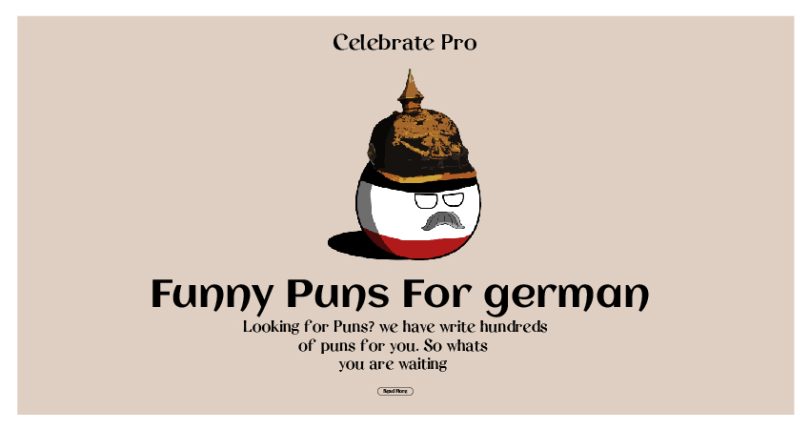Welcome to a world of linguistic delight! German puns, known as “Wortspiel” in German, offer a unique blend of humor and language play. Puns have the power to tickle our funny bones by employing multiple meanings, wordplay, and clever linguistic connections.
In this article, we present a collection of German puns that will bring a smile to your face, whether you’re a language enthusiast, a comedy lover, or simply in need of a good laugh.
What Are German Puns?
German puns, like puns in any language, are wordplay techniques that rely on the multiple meanings, homophones, or similar-sounding words to create humor. They can be found in various forms, such as short puns, one-liners, or puns specifically tailored for different audiences. Whether you’re a beginner or a fluent German speaker, these puns offer a delightful way to explore the German language and its intricacies.
Best Short German Puns
- Was sieht man, wenn man einen Schneemann umwirft? Ein Schneebildnis.
- Probleme kann man niemals mit derselben Denkweise lösen, die sie verursacht hat – sagte Einstein und zog sich die Socken über den Kopf.
- Warum nehmen Skelette keinen Reis? Weil sie damit nicht Fleisch an den Knochen bekommen.
- Warum ist der Wok traurig? Weil er keine Freunde hat, nur Pfannen.
- Was ist das Gegenteil von Fruchtbarkeit? Frieden weit weg.
- Womit brutzeln Vegetarier immer noch gerne? Gerüchten zufolge mit Hunger.
- Womit beschäftigt sich ein Alkoholiker immer noch gerne? Mit Mythen.
- Wie nennt man im Schwarzwald eine Vagina? Schnitzeljagd.
- Warum flog der Vogel aus dem Nest? Weil er flügge war.
- Was machte der Mann mit seinem Handy am Strand? Er sandte seiner Frau eine SMS.
- Was macht ein Schlagloch, wenn es groß ist? Ein Schlaglochbett.
- Warum können Beamte nicht auf Bäumen sitzen? Weil sie sonst ihr Arbeitszimmer vermissen würden.
- Warum können Fische nicht Fußball spielen? Sie können keinen Kopfball machen.
- Welches Tier hat acht Beine? Zwei Spinnen.
- Welcher Hund will immer mehr? Der Labrador.
- Warum baden Kannibalen in der Donau? Damit sie nicht stinken.
- Warum haben Schotten ihre Löcher im Schottenrock? Damit man nicht merkt, ob sie gehen oder stehen.
- Wie nennt man eine schlechte Eistüte? Kratsch-My-Cone.
- Was ist das Lieblingsobst der Mathematiker? Eine Geometrie-Melone.

Oneliner German Puns
- Was sagt man, wenn man eine Prise Türkisches Gewürz möchte? “Komm, ich zeig dir, wie man Kümmel!” (Translation: What do you say when you want a pinch of Turkish spice? “Come, I’ll show you how to cumin!”)
- Warum war der Mathematikbuch traurig? Weil es viele Probleme hatte. (Translation: Why was the mathematics book sad? Because it had many problems.)
- Warum sind Brahmanen schlecht darin, Mixer zu reparieren? Weil sie nur Mixer sind. (Translation: Why are Brahmins bad at repairing mixers? Because they are just mixers.)
- Wie nennt man einen Schnurrbart auf Deutsch? Ein Oberlippenbalken. (Translation: What do you call a mustache in German? An upper lip beam.)
- Warum mag der Matrose keine Avocado? Weil er Seekrank wird. (Translation: Why doesn’t the sailor like avocados? Because he gets seasick.)
- Warum lernen Dinosaurier nie aus ihren Fehlern? Weil sie ausgestorben sind. (Translation: Why do dinosaurs never learn from their mistakes? Because they are extinct.)
- Was ist der beste Brotbelag für Informatiker? Prozessorkäse! (Translation: What is the best bread topping for computer scientists? Processor cheese!)
- Warum haben Lokführer immer ein rotes Taschentuch dabei? Damit sie bei Rot halten können. (Translation: Why do train drivers always have a red handkerchief with them? So that they can stop at red.)
- Wie nennt man einen Beamten, der die Nacht durchmacht? Einen Bundesnacht. (Translation: What do you call a civil servant who stays up all night? A federal night.)
- Was ist der Lieblingssport der Zombies? Gehirn-Jogging. (Translation: What is the favorite sport of zombies? Brain jogging.)
- Wieso haben Ameisen keine Corona-Angst? Sie halten schon immer Abstand. (Translation: Why don’t ants fear corona? They’ve always kept their distance.)
- Was sagt ein Bienenschwarm bei der Wahl des nächsten Arbeitsplatzes? “Sollen wir hier bleiben oder Drohnen gehen?” (Translation: What does a swarm of bees say when choosing their next workplace? “Should we stay here or drone on?”)
- Warum ging der Keks zum Psychologen? Weil er sich krümelig fühlte. (Translation: Why did the cookie go to the psychologist? Because it felt crumbly.)
- Wieso sind Parallelklassen auf dem gleichen Level? Weil sie parallel zu einander verlaufen. (Translation: Why are parallel classes on the same level? Because they run parallel to each other.)
Funny Puns for German Learners
- Warum war der Mathematikbuch traurig? Weil er zu viele Probleme hatte.
- Was ist das Lieblingsspielzeug der Gespenster? Der Schnapp-atem.
- Welches Tier ist am besten im Mathe? Der Rechenhirsch.
- Was sagt ein Mathematiker, wenn er baden geht? “Ich muss mir noch eine Wanne ausrechnen.”
- Was soll man sagen wenn man fertig ist, einen Drachen zu bauen? “Jetzt ist der Drache flugbereit!”
- Wieso konnte der Seestern den Tintenfisch nicht trösten? Weil er nicht mehr als fünf Arme hatte.
- Warum hat der Hamburger keine Freunde? Weil er immer “einzelne” ist.
- Was ist ein Stift ohne Mine? Sinnlos.
- Was ist der Lieblingsfilm von Hunden? Der “Wuff of Wall Street.”
- Wie nennt man einen Bumerang, der nicht zurückkommt? Stock.
- Warum ist die Kuh der Hit auf jeder Party? Weil sie Milchshake mitbringt.
- Was ist die Lieblings-Website eines Baumes? www.Birkenstock.de.
- Wovon haben die meisten Papageien Angst? Vor Kraken-Papageien.
- Warum war der Waschbär in der Bibliothek? Er wollte erstmal ein Buch lesen, wie man Müll durchwühlt.
- Wie nennt man im Englischen einen Bumerang, der nicht zurückkommt? A stick.
- Warum kann ein Nashorn nicht Musik hören? Weil er kein Ohr für Musik hat.
- Warum konnten die Dinosaurier keine Musik hören? Weil sie schon ausgestor-bereichs.
- Was ist die Lieblingsband von Zahnbürsten? Die Bürstis Boys.
- Was ist das Lieblingsinstrument von Vampiren? Die Blutsauggeige.
- Warum können Fische nicht Geige spielen? Weil sie nur im Wasser pizzicato spielen können.
- Wie nennt man eine Eule, die immer traurig ist? Eine Eulennacht.
- Warum haben Ameisen keine Probleme? Weil sie alles hinter sich schleifen.
- Was ist der Lieblingsfilm der Nitrat-Ionen? “Die Nitrate kommen lautlos.”
- Wie nennt man jemanden, der nicht aufhören kann, Witze über Chemie zu erzählen? Ein Witze-Stoff.
- Wie nennt man zwei Straßenmusiker, die sich nicht miteinander vertragen? Eine Dis-Harmonien.
Catchy German Puns for Kids
- What do you call a German sleepwalker? A romber!
- Why did the German boy bring a lollipop to the library? To read the “Lollipops!”
- How do you say “hello” to a German cow? Mootag!
- What do you call a German rubber band? A schnell-ic band!
- How do you say “goodbye” to a German cookie? Biscookie!
- Why did the German teacher wear sunglasses to school? Because her class was so bright!
- Why do Germans prefer eating schnitzel? Because it’s their wurst nightmare to eat something else!
- How do you say “thank you” to a German fireman? Feuer-ty!
- What do you call a German student who’s late for class? Hans-off!
- Why did the German boy wear two jackets to school? Because he wanted to be zweikalt!
- How do you say “I love you” in German? Ich liebe dich!
- Why did the boy take a flashlight to bed? To keep the light on in Deutschland!
- What do you call a German baker with a cold? Achewurst!
- Why did the doctor prescribe German beer to the patient? Because it was the hoppiest medicine he knew!
- How do you say “merry Christmas” in German? Frohe Weinachten!
- What do you get when you cross a German with a roller coaster? A Reissbahn!
- Why did the German girl bring a ladder to school? To reach the higher education!
- How do you say “I’m sorry” in German? Es tut mir leid!
- Why do Germans love making sausages? Because it’s their link to the past!
- What do you call a German who loves puns? A Witze-R!
- Why did the German girl go to college? To get a better Deutsch!
- How do you say “happy birthday” in German? Zum Geburtstag viel Glück!

German Puns in Movies
German puns have found their way into the world of cinema, adding an extra layer of amusement to movies. Some notable examples include:
- In the movie “Inglourious Basterds,” directed by Quentin Tarantino, there is a scene where a character uses a play on words with the German term “Auf Wiedersehen” (goodbye) and “au revoir” (goodbye in French) to create a humorous and tense moment.
- The film “Run, Lola, Run” (Lola rennt), directed by Tom Tykwer, features wordplay and puns in the dialogue, adding a playful element to the high-energy narrative.
- In the animated film “Despicable Me” (Ich – Einfach unverbesserlich), the character Gru’s last name is a pun on the German word “gruselig,” meaning “creepy” or “scary.”
Movies often leverage the richness of language, including puns, to entertain audiences and enhance the storytelling experience.
Key Takeaways
The world of German puns is a treasure trove of linguistic humor and creative wordplay. The puns presented in this article span various categories, including short puns, oneliners, puns for German learners, puns for kids, and even their use in movies. Each pun offers a delightful twist that showcases the beauty and versatility of the German language.
Exploring German puns not only brings joy and laughter but also serves as an educational tool to deepen your understanding of the language. Whether you’re a language enthusiast, a German learner, or simply someone who appreciates a good pun, these wordplays provide a fun way to engage with the German language and its nuances.








